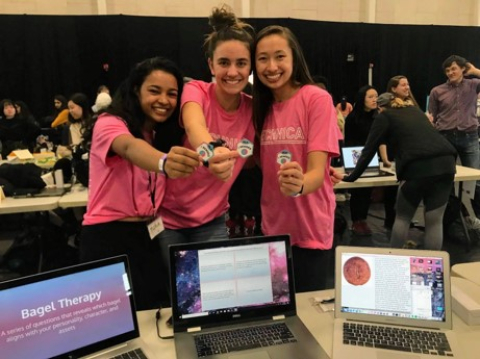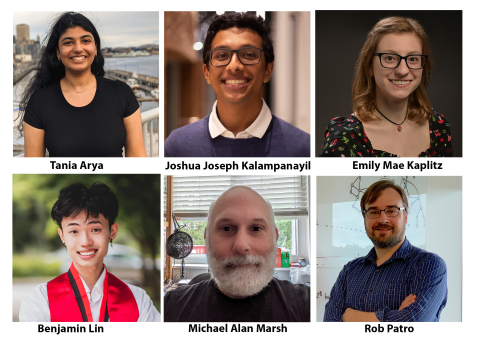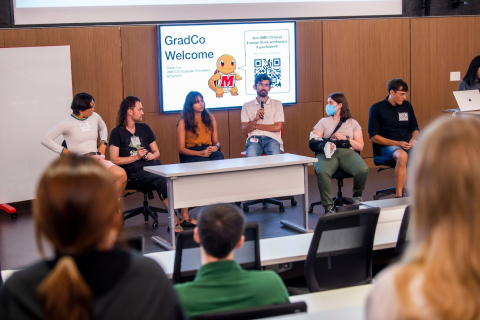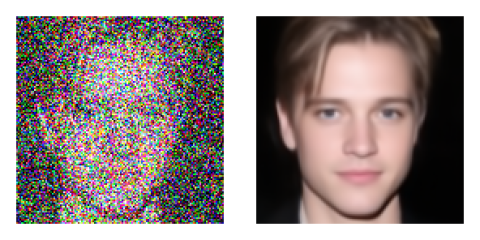Recent News & Accomplishments
2022
UMD computer science major Genevieve Sampson shares thoughts on her first Technica and her current role as co-executive director of the world’s biggest hackathon for underrepresented genders.
Before college, University of Maryland computer science major Genevieve Sampson had never written a line of code in her life. Encouraged by some peers, she decided to attend UMD’s Technica hackathon for underrepresented genders during her freshman year, after hearing that it was a free student-run event for anyone interested in coding and computer science —even those without any prior experience. “I was probably on month three of my computer science intro classes. I didn’t think I was capable of producing the cool projects I wanted to create,” recalled Sampson, who is now a senior. “But the... read more
Steven Armentrout (Ph.D. ’94, computer science) and his company Parabon NanoLabs are creating breakthrough products in forensics and nanotechnology
In June 2022, a Texas police department solved a 20-year-old cold case , finally putting the man who robbed and murdered a Houston-area convenience store owner behind bars. It was all thanks to a relentless detective, DNA evidence from the crime scene—and a tech innovator named Steven Armentrout (Ph.D. ’94, computer science), whose company Parabon NanoLabs (“Parabon”) is taking DNA innovation where it has never been before. “From 2010 to 2014 we built a system called Snapshot ® DNA Phenotyping that can predict appearance, hair color, skin color, face shape and ancestry from a DNA sample,”... read more
Cleaveland served as director of the Division of Computing and Communications Foundations for four years.
Rance Cleaveland spent the last four years as director of the National Science Foundation’s Division of Computing and Communications Foundations (CCF) , one of four divisions under the Directorate for Computer and Information Science and Engineering (CISE). Since returning to the University of Maryland as a professor of computer science with joint appointments in the University of Maryland Institute for Advanced Computer Studies and the Institute for Systems Research , he shared his experiences and insight in an interview with UMD’s College of Computer, Mathematical, and Natural Sciences... read more
The department is pleased to announce our winners for the teaching award for the academic year 2021-22. Based on the nominations made by the students and the faculty the award committee selected the following recipients for this year's teaching awards: Best Undergraduate Teaching Assistant : Joshua Kalampanayil nominated for CMSC 330, Organization of Programming Languages, and Tania Arya nominated for CMSC 131, Object-Oriented Programming I Best Graduate Teaching Assistant : Emily Kaplitz nominated for CMSC 250, Discrete Structures Best STIC Facilitator : Benjamin Lin nominated for CMSC 389P... read more
Targeted online advertising is now ubiquitous, with search engines and online social networks using powerful targeting technologies so that advertisers can deliver their sales pitch to specific end-users. While these technologies can help users see more relevant ads, they also raise privacy and equity concerns, with targeted ads often impacting employment, housing and credit opportunities that online users see. With funding from the National Science Foundation, a University of Maryland expert in cybersecurity and human-computer interaction is part of a multi-institutional team exploring this... read more
With today’s technology, it’s easier than ever to communicate, accomplish tasks, and work remotely. Yet this over-reliance on computers and smartphones can also have negative effects—contributing to information overload, social media addictions, and mental health issues. A new faculty member at the University of Maryland studies the relationship between technology and health, and how digital and physical tools can sustain and improve our well-being. Pablo E. Paredes Castro, who joined UMD this semester as an assistant professor of computer science, says his research is focused on the... read more
In 2021, when Jade LeSchack was a high school senior imagining herself at potential colleges, she was already entranced by physics—quantum physics in particular. After taking high school physics classes and an online course on quantum computing, she wanted to explore the world of physics more fully. “I loved that in class we talked about a lot of different topics that were not just mechanics related,” LeSchack said. “We were talking about waves, quantum mechanics a little bit here and there, about sound and things like that. That's where I really found a love for physics. And then taking the... read more
The department also ranks in the top 10 among the country’s public universities in five computer science specialties.
The University of Maryland’s computer science program ranks 8th among the country’s public undergraduate programs in the 2023 edition of U.S. News & World Report ’s “Best Colleges.” The program ranks 16th overall, climbing two spots this year. UMD also ranks in the Top 20 in five computer science specialties: Game Development: #4 public, #9 overall Cybersecurity : #5 public, #9 overall Artificial Intelligence : #8 public, #16 overall Software Engineering: #10 public, #13 overall UMD’s computer science graduate program ranks 17th in the nation according to the latest list from U.S. News... read more
On Wednesday, August 24, the department hosted its annual Orientation Day to welcome its Fall 2022 cohort of graduate students. The event was attended by more than 60 incoming PhD students and 20 new Master of Science students. Professor Matthias Zwicker , the Department Chair, welcomed the new students to UMD, and Professor Ramani Duraiswami , the Associate Chair for Graduate Education, provided the students with an overview of the graduate education program. Staff from the department and UMIACS introduced the incoming students to the logistics of using IT facilities, payroll, and other... read more
With the rise of artificial intelligence in commercial products, advanced watermarking methods can ward off copycats
Companies spend vast amounts of time and millions of dollars on the development of neural network models that are used in facial recognition, artificial intelligence (AI) art generators and other cutting-edge technologies. These pricey, proprietary models could be prime targets for theft in the future, which prompted a team of University of Maryland researchers to create an improved watermark to protect them. Watermarks are a way for organizations to claim authorship of the models they create, akin to a painter signing their name in the corner of a painting. However, current watermarking... read more









